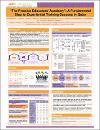The Design of Preceptor Development Program for Health Cluster in Qatar 'The Practice Educators Academy'
| Author | Mukhalalati, Banan AbdulRzaq |
| Author | ElShami, Sara |
| Author | Awaisu, Ahmed |
| Author | Javed, Bridget |
| Author | Carr, Alison |
| Author | Bawadi, Hiba |
| Author | Almahasneh, Randa |
| Author | Al-Khal, Adbdullatif |
| Author | Zolezzi, Monica |
| Author | Mosleh, Ayad |
| Author | Abuhijleh, Marwan |
| Author | Bacha, Racha |
| Available date | 2020-10-26T08:49:53Z |
| Publication Date | 2020 |
| Publication Name | Qatar University Annual Research an Exhibition 2020 (quarfe) |
| Citation | Mukhalalati B.A.R., ElShami S., Awaisu A., Javed B., Carr A., Bawadi H., Almahasneh R., AlKhal A., Zolezzi M., Mosleh A., Abuhijleh M., Bacha R., " The Design of Preceptor Development Program for Health Cluster in Qatar 'The Practice Educators Academy'", Qatar University Annual Research Forum and Exhibition (QUARFE 2020), Doha, 2020, https://doi.org/10.29117/quarfe.2020.0140 |
| Abstract | Background: Experiential learning is the backbone of many healthcare professional education programs, and the quality of experiential learning is dependent on the skills, experiences, and proficiency of the clinical preceptors who largely contribute to this experience. Preceptors should ideally possess both clinical practice and teaching skills; however, preceptors often do not possess formal training as educators. This research was conducted at Qatar University with the aims of identifying preceptors' educational needs and developing the skills by designing an educational professional development program called: 'The Practice Educators' Academy'. Methods: A mixed-methods triangulation study design was applied to identify preceptors' educational needs quantitatively through a validated survey sent to preceptors (n=325), and qualitatively by conducting 11 focus groups with preceptors (n=20), students (n=42), sand clinical faculty members (n=7). Quantitative and Qualitative data in addition to an extensive literature review were used in designing the academy by an inter-professional healthcare and educational team. Results: Principles of learning theories, planning for experiential learning, teaching strategies, students' assessment and feedback, and communication skills for effective preceptorship and conflict resolution were the key domains expressed as preceptors' educational needs. A five-module program syllabus was designed to meet these needs while benchmarking it with international preceptors' educational development programs. The designed syllabus was critically examined and validated by national and international health professional education scholars. Conclusions: 'The Practice Educators' Academy' is the first intervention nationally and regionally that aims at improving preceptors' teaching skills required to prepare competent health profession graduates. This will advance healthcare outcomes, meet the healthcare needs of Qatar society, and ultimately contribute to achieving Qatar National Vision 2030. Future studies should focus on evaluating the effectiveness of the program in improving preceptors' knowledge and skills, and enhancing students' satisfaction before full implementation at a national level. |
| Language | en |
| Publisher | Qatar University Press |
| Subject | Capacity Building Experiential Learning Mixed Methods Research Professional Development Education Research |
| Type | Poster |
Files in this item
This item appears in the following Collection(s)
-
Theme 2: Population, Health & Wellness [118 items ]


